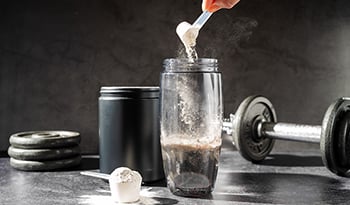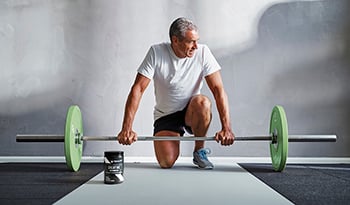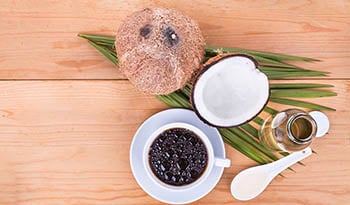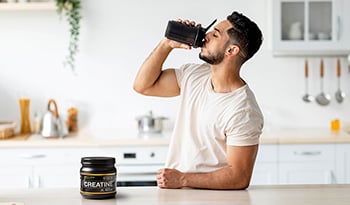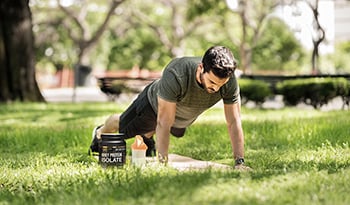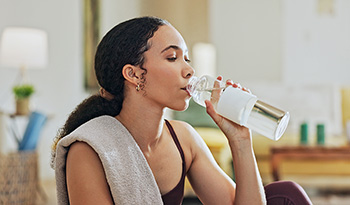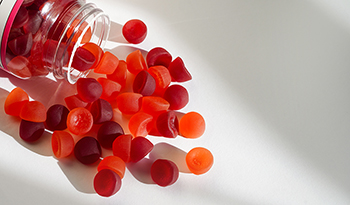補充肌酸的綜合指南
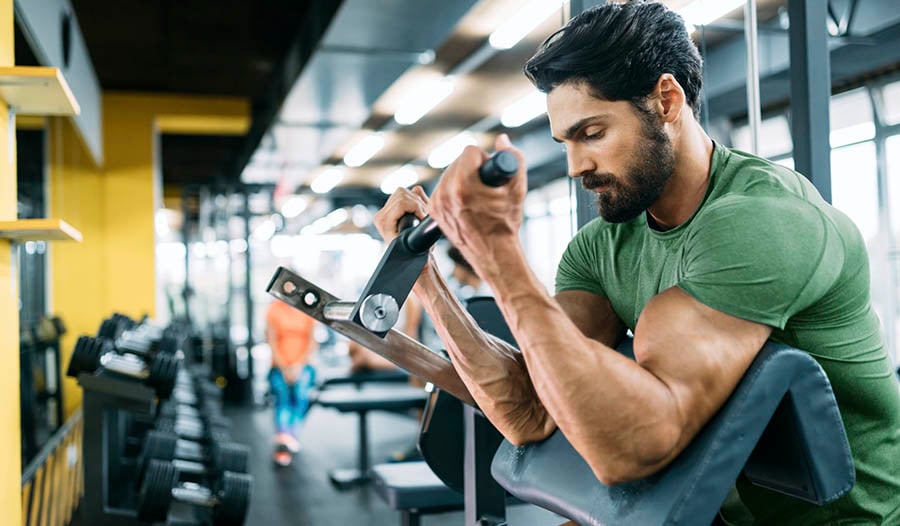
作者:Joshua Nackenson醫生
肌酸是天然的物質,主要存在於肌肉細胞中。它是通過膳食獲取的,主要是肉類和海鮮;有一小部分則是由人體產生的。如果沒有任何補充,肌肉存儲的肌酸通常約為60-80%的飽和度。由於素食者飲食中並無顯著的肌酸來源,肌肉儲存量基線往往更低,因此受益於補充的程度更大。肌酸的主要功能是補充三磷酸腺苷(ATP)的存量,ATP是用於細胞內能量的分子。在短暫的劇烈運動中,快速再生ATP的能力有一部分是取決於肌肉中的肌酸酐含量。
自20世紀80年代以來,肌酸一直受到廣泛研究,發表的研究報告超過1000份。補充肌酸對錶現的主要裨益,是提高在健身房和運動場上的能力。關於提升表現的研究大多數都發現,在高強度練習中約有10-20%的改善。例如,在一項對受過阻力訓練的男性進行的研究中,攝取肌酸的組別平均能夠在五組臥推中多做1-2次(練到極限次數)。雖然多做1-2次可能看起來不是很多,但經過一段時間,能夠多做10-20%的次數可增加肌肉建設和力量。
肌酸是否適合所有人?
肌酸主要是對男性進行研究,但大多數女性的研究看來都顯示出類似的益處。事實上,一些研究甚至表明,女性對肌酸的反應比男性更大。此外,老年人肌酸補充有廣泛的研究,也有類似的結果。遺憾的是,肌酸的影響似乎並非對所有人都一樣──不同的人對肌酸的反應也有異,有些人的表現幾乎完全沒有改善,有些人則有明顯的改善。雖然有些人可能沒有那麼強烈的反應,肌酸還是可值得一試。它被認為是提高運動能力和幫助建立肌肉的最有效補充劑。
是否安全?
肌酸是被研究得最多的表現提升補充劑之一,擁有超過30年的數據,其安全性有大量證據支持。曾有一些報告指肌酸可引起脫水和肌肉痙攣,但最好的研究並未顯示有這些情況。 此外,有一種誤解是肌酸可能會傷腎。對不同群體從年輕健康者到老年病患者的短期和長期研究,均未顯示出任何負面影響。
有副作用嗎?
在所有研究中一致的唯一的副作用是會有少許的體重增加,主要是由於肌肉內的水分瀦留增加。不是每個人都會在攝入肌酸後增加體重,但大多數研究顯示,體重75公斤左右的人平均增重略超過1公斤,範圍從1公斤至 3公斤。
如何攝取肌酸?
肌酸有多種配方,最便宜、最受歡迎而且被研究得最多的是一水肌酸。一水肌酸通常以丸劑和粉劑形態提供,效力相當。肌肉的肌酸儲存必須處於飽和狀態,肌酸才能發揮效果。服用肌酸時有兩種選擇:衝擊期和非衝擊期。
- 衝擊期:每公斤體重攝入0.3克,服用5-7天,然後每天5克。衝擊期讓一個人的肌肉肌酸儲存在約一周內達到飽和狀態,並開始看到結果。衝擊期的缺點是每天需要攝入大量肌酸。儘管一些最穩健的研究並無一致顯示有腸胃不適,但一項研究表明,當服用每份多於5克的劑量時,腸胃不適更為普遍。
- 非衝擊期:每天服用5克。通常需要約3-4週,肌肉肌酸儲存才達到飽和狀態。要有耐心。
常有人討論肌酸在訓練期間的補充時機,然而於何時攝取肌酸可獲得最大效益,並沒有很強的科學論證。大多數研究並無強調攝入肌酸的時間。一項對老年人進行的小規模研究顯示,在鍛煉前和鍛煉後攝入肌酸,效果沒有差異;而另一項對年輕的健美運動愛好者進行的小型研究顯示,身體成分和臥推重複次數的最大重量(RM)略有改善。如果你通常在鍛煉後喝一杯蛋白質奶昔,不妨加入肌酸以獲得潛在的益處,但如果你在鍛煉之前攝取,也是沒有問題的。
咖啡因等補充劑會使人體產生耐受性,效果會隨著時間減弱,肌酸則不同,效果是持續的,不需要停服再繼續。
一些人主張同時攝入肌酸和大量碳水化合物,以提高吸收和肌肉中的肌酸總儲存量。確實,碳水化合物有助肌酸進入肌肉,然而還沒有研究表明這種策略對錶現有幫助。
除一水肌酸外,還有其他形態的肌酸,如鹽酸肌酸(HCl)和肌酸乙酯(CEE)。這些肌酸是否優於一水肌酸,目前並無科學文獻支持。鹽酸肌酸的主要優點是更容易溶於水,不過價格較高。一些人聲稱,鹽酸肌酸所需的總劑量比一水肌酸為低,但尚未有這方面的研究。另一方面,肌酸乙酯效果似乎與安慰劑相同,看來不如一水肌酸有效。
總結一下,肌酸是安全、高度有效和便宜的。每天服用肌酸......這是醫囑!
參考文獻:
- Brosnan ME, Brosnan JT. The role of dietary creatine. Amino Acids. 2016;48(8):1785-1791.
- Kreider RB, Kalman DS, Antonio J, et al. International society of sports nutrition position stand : Safety and efficacy of creatine supplementation in exercise , sport , and medicine. . 2017:1-18.
- Burke DG, Chilibeck PD, Parise G, Candow DG, Mahoney D, Tarnopolsky M. Effect of creatine and weight training on muscle creatine and performance in vegetarians. Medicine and science in sports and exercise. 2003;35(11):1946-55.
- Kreider RB. Effects of creatine supplementation on performance and training adaptations. Molecular and Cellular Biochemistry. 2003;244(1-2):89-94.
- Volek JS, Kraemer WJ, Bush Ja, et al. Creatine supplementation enhances muscular performance during high-intensity resistance exercise. Journal of the American Dietetic Association. 1997;97(7):765-770.
- Kresta JY, Oliver JM, Jagim AR, et al. Effects of 28 days of beta-alanine and creatine supplementation on muscle carnosine, body composition and exercise performance in recreationally active females. Journal of the International Society of Sports Nutrition. 2014;11(1):55.
- Larson-Meyer DE, Hunter GR, Trowbridge CA, et al. The effect of creatine supplementation on muscle strength and body composition during off-season training in female soccer players. Journal of Strength and Conditioning Research. 2000;14(4):434-442.
- Vandenberghe K, Goris M, Van Hecke P, Van Leemputte M, Vangerven L, Hespel P. Long-term creatine intake is beneficial to muscle performance during resistance training. Journal of applied physiology. 1997;83(6):2055-63.
- Branch JD. Effect of creatine supplementation on body composition and performance: A meta-analysis. International Journal of Sport Nutrition and Exercise Metabolism. 2003;13(2):198-226.
- Chilibeck PD, Kaviani M, Candow DG, Zello GA. Effect of creatine supplementation during resistance training on lean tissue mass and muscular strength in older adults: A meta-analysis. Open access journal of sports medicine. 2017;8:213-226.
- Syrotuik DG, Bell GJ. Acute creatine monohydrate supplementation: A descriptive physiological profile of responders vs. nonresponders. Journal of Strength and Conditioning Research. 2004;18(3):610-617.
- Kreider RB, Kalman DS, Antonio J, et al. International society of sports nutrition position stand: Safety and efficacy of creatine supplementation in exercise, sport, and medicine. Journal of the International Society of Sports Nutrition. 2017;14(1):1-18.
- Gualano B, Ugrinowitsch C, Novaes RB, et al. Effects of creatine supplementation on renal function: A randomized, double-blind, placebo-controlled clinical trial. European journal of applied physiology. 2008;103(1):33-40.
- Groeneveld GJ, Veldink JH, van der Tweel I, et al. A randomized sequential trial of creatine in amyotrophic lateral sclerosis. Annals of neurology. 2003;53(4):437-45.
- Neves M, Gualano B, Roschel H, et al. Effect of creatine supplementation on measured glomerular filtration rate in postmenopausal women. Applied physiology, nutrition, and metabolism = Physiologie appliquee, nutrition et metabolisme. 2011;36(3):419-22.
- Powers ME, Arnold BL, Weltman AL, et al. Creatine supplementation increases total body water without altering fluid distribution. Journal of Athletic Training. 2003;38(1):44-50.
- Demant T, Rhodes E. Effects of creatine supplementation on exercise performance. Sports Medicine. 1999;28(1):49-60.
- Ostojic SM, Ahmetovic Z. Gastrointestinal distress after creatine supplementation in athletes: Are side effects dose dependent? Research in Sports Medicine. 2008;16(1):15-22.
- Candow DG, Zello GA, Ling B, et al. Comparison of creatine supplementation before versus after supervised resistance training in healthy older adults. Research in sports medicine (Print). 2014;22(1):61-74.
- Antonio J, Ciccone V. The effects of pre versus post workout supplementation of creatine monohydrate on body composition and strength. Journal of the International Society of Sports Nutrition. 2013;10:1-8.
- Steenge GR, Simpson EJ, Greenhaff PL. Protein- and carbohydrate-induced augmentation of whole body creatine retention in humans. Journal of applied physiology 2000;89(3):1165-71.
- Green AL, Hultman E, Macdonald IA, Sewell DA, Greenhaff PL. Carbohydrate ingestion augments skeletal muscle creatine accumulation during creatine supplementation in humans. The American journal of physiology. 1996
- Jäger R, Purpura M, Shao A, Inoue T, Kreider RB. Analysis of the efficacy, safety, and regulatory status of novel forms of creatine. Amino acids. 2011;40(5):1369-1383.
- Spillane M, Schoch R, Cooke M, et al. The effects of creatine ethyl ester supplementation combined with heavy resistance training on body composition, muscle performance, and serum and muscle creatine levels. Journal of the International Society of Sports Nutrition. 2009;6:1-14.
免責聲明:本健康中心不提供診斷⋯





















































































